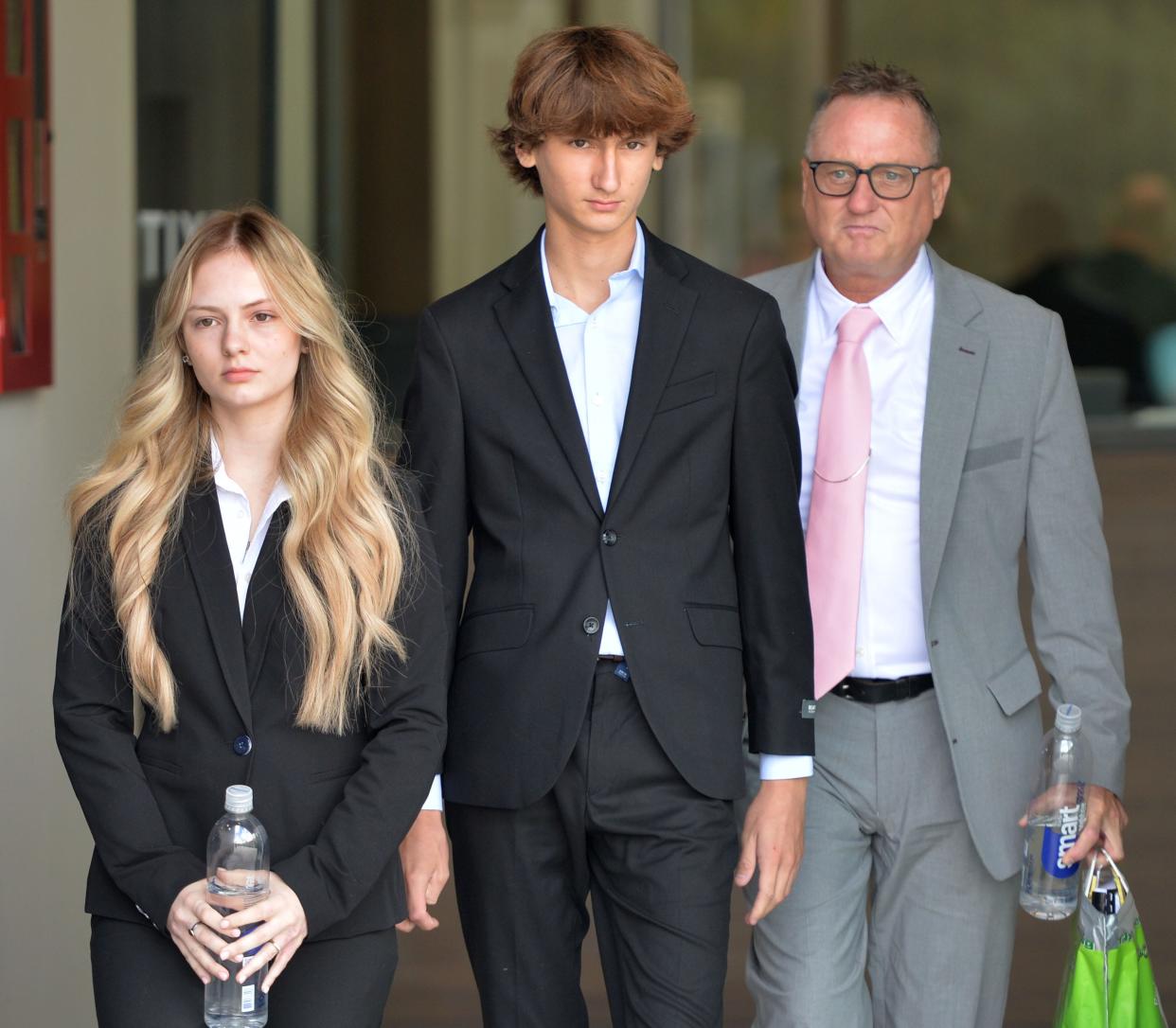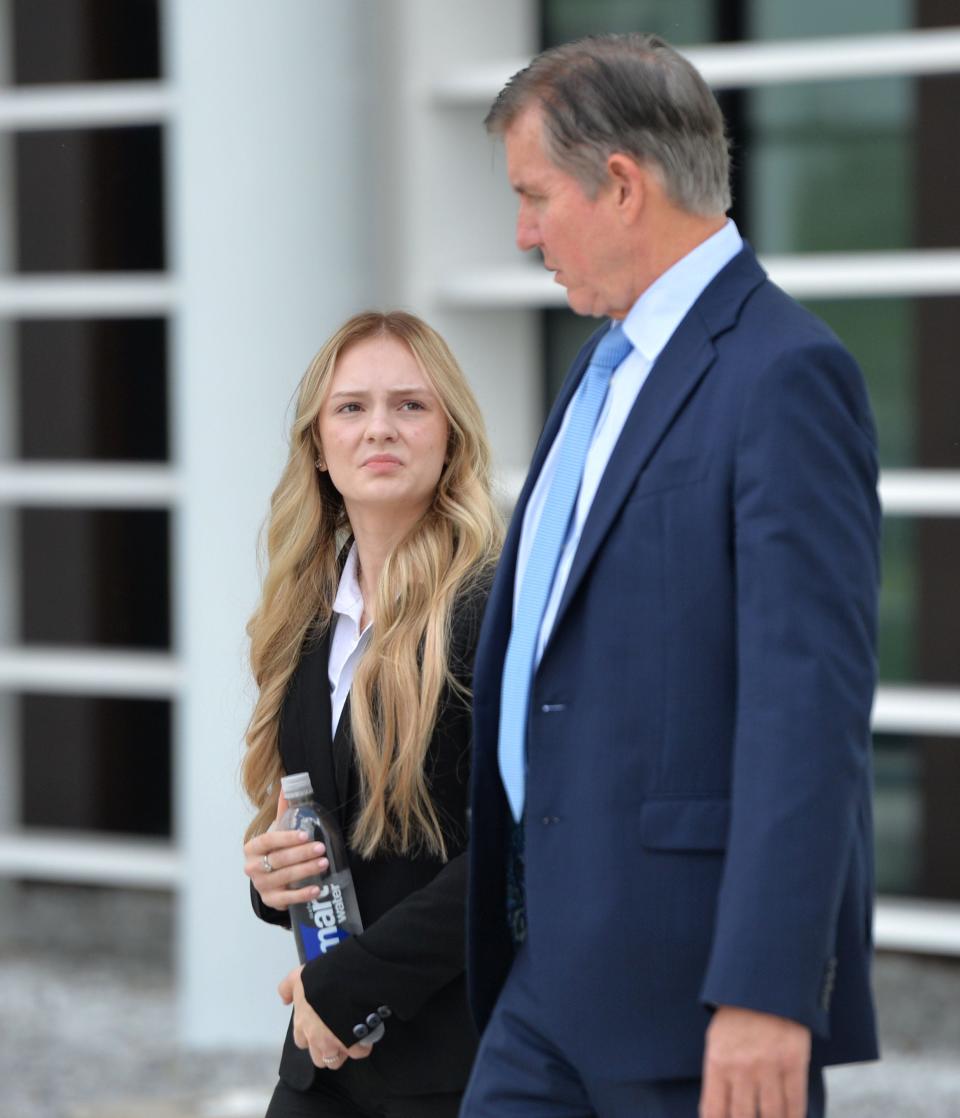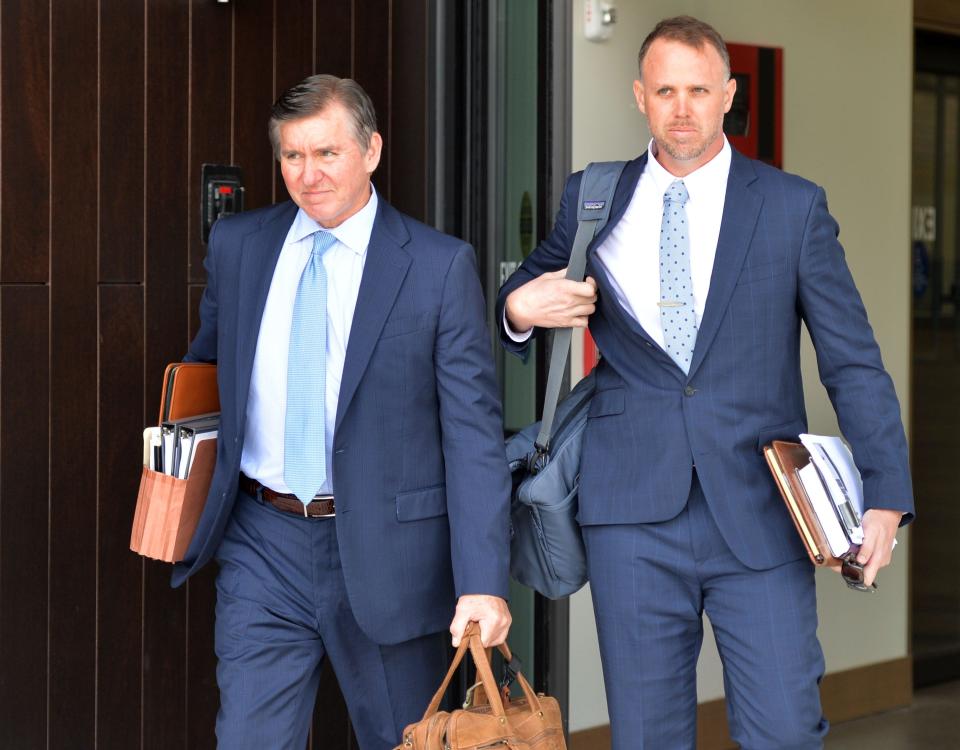Trial begins in 'Take Care of Maya' case, attorneys lay out what to expect

More than a year after the Kowalski family expected to go to trial and almost five years after they filed their lawsuit against Johns Hopkins All Children's Hospital, their day in court finally arrived.
Every seat at the four tables, two per side, before the judge was filled Thursday with both attorneys and their clients.
Maya Kowalski, wearing a black suit as her blond hair cascaded down beyond her shoulders, sat between two of her attorneys in the front row. Her father and younger brother, Jack and Kyle Kowalski, sat behind her.
The Kowalski family is suing the hospital on several counts, including false imprisonment, negligent infliction of emotional distress, medical negligence, and battery, among other claims. The family initially sued the hospital, social worker Catherine Bedy and others in October 2018, more than a year after Beata Kowalski took her life after being separated from her daughter due to child abuse allegations.
Jury selection coverage: Venice family drops social worker from lawsuit against All Children's Hospital
Previous reporting: 'Take Care of Maya' Netflix documentary gives voice to Venice family suing hospital
The family's attorney, Greg Anderson, and Bedy's attorney, Patricia Crauwels, dropped the case against Bedy in a walkaway agreement during jury selection with the lawsuit now focused on the hospital.
The civil case between the Venice family and the St. Petersburg hospital captured national media attention following the June premiere of the Netflix film “Take Care of Maya,” which in part was inspired by reporting by the Sarasota Herald-Tribune. The film focuses on the Kowalski family's story as it peels back Florida’s child healthcare and welfare system.
The family took 10-year-old Maya Kowalski to the hospital in October 2016 due to severe pain which they believed was a possible relapse of her Chronic Regional Pain Syndrome, a disorder that impairs the central nervous system and heightens pain sensations.
While at the hospital, an abuse report was submitted against Beata and Jack Kowalski, and their daughter, Maya Kowalski, was placed under protective custody from a court order, beginning a three-month effort by her parents to bring their daughter home.
Prior to opening statements, Circuit Court Judge Hunter Carroll went over a few pieces of information with the jury to inform them of what to expect during the trial, including the fact that the Court had previously determined that All Children's Hospital had reported in good faith their suspicion of child abuse of Maya Kowalski and couldn't be found liable for that. He added the current case is not about that report.

'An emotional case'
On two large screens facing the gallery in one of the courtrooms in the South Sarasota County courthouse in Venice photos of the Kowalski family — Jack, Beata, Maya and Kyle — were shown during the plaintiffs’ opening statements.
Anderson, a Jacksonville-based attorney, stood before the jury in a navy blue suit as he spoke earnestly in a quiet voice about the evidence and testimony he planned to lay before them in the upcoming weeks of the trial.
Some of the photographs included pictures of the family smiling, a photo of 10-year-old Maya Kowalski sitting in a wheelchair with two monkey stuffed animals tucked under her arms and her feet curling inward, Maya Kowalski curled in pain lying on a hospital bed, and a photo of her sitting on top of her brother’s shoulders in their swimming pool at home on the mend.
Anderson explained to the jury that the core claims of his clients’ case included medical malpractice, battery, false imprisonment, intentional infliction of emotional distress, and fraud. He added that at the end, he was asking the jury to not only award compensatory damages but also punitive damages to prevent the hospital from repeating the same actions.
He told the jury that Maya Kowalski was wrongfully imprisoned on three separate occasions while at All Children’s Hospital in St. Petersburg during her three-month stay between October 2016 and January 2017.
“Maya was repeatedly battered by nurses and social workers who were trying to prove she did not have CRPS,” Anderson said, adding they continuously patted her, hugged her against her will, and took her to Bedy, who nurses supposedly told Maya would be her new mother because her “mother was crazy."
At different times during Anderson’s opening statements, both Maya and Kyle Kowalski teared up listening to and seeing the images on the screen.
Keep reading: What's happening in 'Take Care of Maya' case? Hearing sets parameters for jury selection
Herald-Tribune investigations: Torn apart
Anderson detailed how Maya’s symptoms began in July 2015 and progressively worsened. Her parents, desperate to help their child, took her to All Children’s Hospital, flew to a hospital in Chicago, went to Tampa General Hospital and to various specialists before finding Dr. Anthony Kirkpatrick, who diagnosed Maya with Complex Regional Pain Syndrome and began treating the young child with ketamine infusions.
“She did not want to be one of the kids that was looking out the window while all the other kids were playing,” Anderson said.
The treatments appeared to work, Anderson said, with Maya’s dystonia, a neurological movement disorder that causes muscles to involuntarily contract, improving and nearly gone.
But then in October 2016, after Maya Kowalski appeared to have relapsed, Jack and Beata Kowalski took her to All Children’s Hospital where the parents were ignored by doctors, nurses, and social workers as Beata Kowalski attempted to explain her daughter’s medical history and insisted her daughter needed ketamine treatments to help, Anderson said.
Then the separation happened, and Maya Kowalski was not only separated from her family, but her friends and religion as well since it appeared hospital staff thought Maya Kowalski was being controlled by her mother through that aspect as well, Anderson said. Even the family's priest was barred from visiting.
“By Jan. 13, when Maya was finally out of the hospital, unsurprising, this family was a wreck,” Anderson said, indicating the fact that Beata Kowalski had died by suicide the week prior.

As Anderson neared the conclusion of his opening statements, he told the jury that the defense would present themselves as saviors and that over the upcoming weeks, he would put on the best evidence he could for the jury to decide what they think is right.
Dedicated medical professionals trying to keep patient safe, give proper treatment
Howard Hunter, head of the healthcare litigation team for Hill Ward Henderson, stood before the jury with his glasses perched just at the top of his forehead above his gray hair.
“This is a case that has a number of different facets to it and the circumstances and facts that I’m about to discuss with you constitute our view of the evidence,” Hunter said in a soft-spoken voice.
Hunter told the jury that the Kowalskis had been to the hospital on several occasions prior to the Oct. 7, 2016, admittance which began the three-month period the case would focus on.
“We had no reason to wish this family harm, and we still don’t,” Hunter said. “Indeed, there’s a tragic outcome in this case in terms of Mrs. Kowalski’s suicide and we regret very much that that happened. The issue here, however, is who is responsible for that?”
Hunter added the evidence that will be presented will not show a connection between what the hospital did and Beata Kowalski’s death.
The first part of Hunter’s presentation to the jury detailed the events of Oct. 7 when the Kowalskis brought Maya to the hospital with severe stomach pain; how she was on 21 different medications, including very high doses of ketamine; that Beata Kowalski was difficult with doctors and nurses when they arrived and how Beata Kowalski wanted the hospital an intrathecal infusion pump implanted in her daughter.
Hunter detailed that several of the witnesses he intends to bring before the jury include doctors who treated Maya Kowalski at the hospital and who wanted to wean her off the medications and send Maya Kowalski to an outpatient clinic so she could receive intensive physical, occupational, and psychological cognitive behavioral therapies.
Some of the witnesses Hunter listed included Dr. Laleh Bahar-Posey, Dr. Richard Elliott, Dr. Lisgelia Santana-Roja, Dr. Beatriz Teppa-Sanchez, and Dr. Jenny Dolan, among others.
More: Sarasota judge bars allegations of prescription fraud in 'Take Care of Maya' civil case
Previous reporting: Doctor's suspicion tears apart Venice family
Throughout his statements, Hunter continuously pressed that the care that doctors, nurses, and social workers provided for Maya was reasonable, necessary and appropriate.
He pointed to the fact that since Maya left the hospital in January 2017, she’s one of the top of her class at Venice High School, on track to get her high school diploma and an A.A. degree, served in student government, she’s working out, dating and not taking pain medications.
Hunter also highlighted how the evidence shown in court would indicate that in the year Maya Kowalski was on ketamine prior to being admitted to All Children’s Hospital on Oct. 7, she was wheelchair bound, was hypersensitive to touch, unable to use her arms or legs, had chronic complaints of extreme pain, leg atrophy and only gained 4.5 pounds.
In comparison, after three months at the hospital, she gained the same amount of weight, was still in a wheelchair but more comfortable, was using her arms, was better nourished, was on only three medications and was improving, Hunter said.
“You’re not going to hear any evidence that the 50-some-odd medical doctors and professionals that took care of Maya Kowalski over three months somehow banded together in some sort of cabal and hatched a plot or conspiracy to do harm,” Hunter said.
Instead, Hunter said jury members would hear from dedicated medical professionals who were genuinely trying to care for Maya Kowalski and while it may have differed opinions with the family, the main goal was to keep Maya safe and get her the proper treatment she needed.
Gabriela Szymanowska covers the legal system for the Herald-Tribune in partnership with Report for America. You can support her work with a tax-deductible donation to Report for America. Contact Gabriela Szymanowska at gszymanowska@gannett.com, or on Twitter.
This article originally appeared on Sarasota Herald-Tribune: Trail begins in 'Take Care of Maya' case as family appears in court

